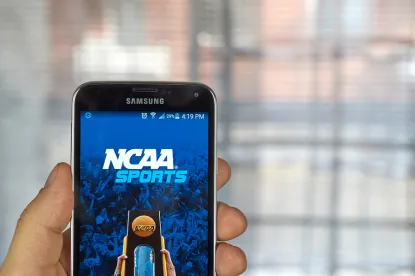While still relatively new, the laws and rule changes allowing college athletes to profit from use of their name, image, and likeness (NIL) have already had dramatic impacts on the landscape of college athletics. On June 30, 2021, the NCAA issued an interim policy for college NIL, allowing student athletes to profit from use of their NIL with minimal restrictions. The NCAA’s rule change came after several states had enacted laws allowing college athletes to earn compensation from use of their NIL. Following the NCAA rule change, the states with NIL laws quickly found themselves operating under more restrictions than the states without such laws – in an odd twist, states that had been at the forefront of NIL issues began lagging behind. As a result, the focus of many states that have adopted NIL legislation has shifted to repealing it or revising it to make it more flexible in the light of the minimal restrictions provided under the NCAA guidelines.
Consider, for example, the state of Florida, which has been an NIL pioneer of sorts before. In June 2020, Florida passed an NIL bill with an effective date of July 1, 2021, which established the earliest timeline across the country for NIL changes and resulted in numerous other states passing their own NIL laws. However, Florida’s law and many other states’ NIL laws contain provisions prohibiting colleges from facilitating NIL deals for student athletes or causing compensation to be directed to student athletes, a practice not expressly prohibited under the NCAA’s interim policy.
On December 15, 2021, Florida Rep. Chip LaMarca filed a bill designed to provide schools more freedom and ability to facilitate NIL deals with current student athletes. The bill would make seemingly minor changes to Florida’s existing NIL law but could potentially have greater impact on the ways universities and businesses operate in the NIL space. The bill would remove the requirement that NIL deals only be provided by third parties unaffiliated with the student athlete’s university. Additionally, the bill strikes language that prohibits schools from “causing compensation to be directed” to athletes and expressly provides that colleges may “cause compensation to be directed to a current intercollegiate athlete.”
The state of Alabama took a different approach. On February 3, 2022, Alabama Gov. Kay Ivey signed into law a bill that repealed Alabama’s NIL law in its entirety. Alabama enacted its original NIL law on April 20, 2021. However, Alabama, like other states with NIL laws, found itself operating under more restrictive rules than states without such laws. The repeal of Alabama’s law means that NIL deals in Alabama will be subject to fewer regulations and restrictions. It is likely that other states with NIL laws will follow Florida and Alabama’s lead in amending or repealing their own NIL laws to gain the benefit of less regulation.
A similar trend can be seen in states that are currently considering new NIL legislation. Those states are not including language prohibiting colleges from facilitating deals. For example, Kentucky’s NIL bill, which passed unanimously in the Senate on February 10, 2022, expressly allows colleges to establish programs to provide “NIL agreement resources and ongoing support” to student athletes, including “referring third parties soliciting potential NIL agreements to student athletes or their agents.” Virginia also has a similar NIL bill working through the legislature that would not prohibit colleges from facilitating NIL deals.
This same trend may be seen at the college-specific level as well. Many colleges that had developed their own internal NIL policies, including various restrictions regarding NIL agreements, are likewise amending those policies to allow more flexibility. For example, Ohio State University amended its NIL policy to create the “NIL Edge Team” developed by the Department of Athletics. The NIL Edge Team is an internal advisory group that will assist student-athletes at Ohio State in pursuing NIL opportunities. It is likely that other colleges will begin to rethink their own NIL policies to maintain a competitive edge.
While states and colleges are trying to navigate the rapidly changing landscape of NIL, a new industry of sports marketing agencies that facilitate NIL deals for athletes has also emerged. They are known as “collectives” and have been popping up throughout the country with the goal of raising funds for NIL deals for athletes at certain colleges. Examples of such collectives include the Clark Field Collective, which was formed by a group of University of Texas donors. The purpose of the collective is to pool money from supporters of University of Texas athletics to facilitate NIL deals with student athletes. On the West coast, Phil Knight and other Nike executives founded another collective called Division Street to facilitate NIL deals for University of Oregon athletes. The Gator Collective is another example aimed at facilitating NIL deals for University of Florida athletes. It charges its members a subscription fee to gain access to exclusive content, while also taking monetary pledges from members to help fund NIL deals. Originally many state NIL laws, such as in Florida and Alabama, barred groups like these collectives from coordinating directly with colleges, but the NCAA did not prohibit it. The current trends are opening the door for collectives to coordinate directly with colleges.
Meanwhile, the NCAA has also taken some additional actions in regard to NIL. In January, NCAA members approved the adoption of a new constitution, which requires each NCAA division to establish guidelines regarding commercialization of a student athlete’s NIL. On February 18, 2022, the NCAA Division I Board of Directors tasked the Division I Council with reviewing how NIL policies are impacting college athletes and college athletics. The Division I Council has been asked to provide a preliminary report on its findings by April and a final report, with recommendations for possible actions, in June.
Although a trend of deregulation is unifying the approach to NIL in various states somewhat, there remains a patchwork of state laws in place, resulting in non-uniform NIL policy across the United States. Such inconsistency creates confusion with respect to what NIL activities are permissible and what NIL activities are prohibited. While there have been discussions and even a few proposed bills in the past, a federal NIL law does not appear to be forthcoming any time soon. While it may come at some point, for now, businesses, fans, donors, colleges, and student athletes will need to continue to monitor NCAA policy as well as their respective state laws and college rules.




 />i
/>i

